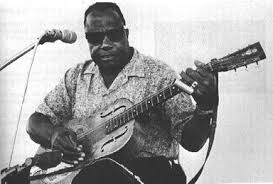Bukka White: A Life in the Blues
Introduction
Bukka White stands as one of the most compelling figures in Delta blues history. His music—fierce, rhythmic, and emotionally raw—bridges the gap between early 20th-century spiritual traditions and the developing blues genre. Born in the Mississippi Delta and shaped by both rural and urban influences, White’s recordings, particularly in the 1930s and 1940s, left an indelible mark on blues and American music at large. He was not only a singer and guitarist but also a slide-guitar virtuoso and storyteller whose songs embodied the struggles, hopes, and spirit of African Americans in the Jim Crow South.

Childhood
Booker T. Washington White—later known as Bukka White—was born on November 12, 1909, near Houston, Mississippi. His parents were deeply religious and active in the local Baptist church. Music was a natural part of family life. His father played fiddle, and the young White grew up listening to spirituals, hymns, and early blues tunes.
At an early age, he demonstrated a strong interest in music, learning to play guitar and showing a particular talent for rhythm and timing. White was also exposed to the music of his cousin, the legendary B.B. King, who would later cite Bukka as a major influence.
While his formal education was limited, the oral traditions of storytelling and song in his community provided him with a rich foundation. These early years—filled with work in the fields, family gatherings, and church meetings—helped instill in him a deep sense of cultural identity that would later manifest powerfully in his music.
Youth
As a teenager, White began playing at local gatherings, fish fries, and house parties. He initially modeled his playing after Charlie Patton, another Mississippi bluesman whose booming voice and aggressive guitar style left a strong impression.
During the 1920s, Bukka White traveled extensively, hopping freight trains and working in various jobs across Mississippi and the South. This itinerant lifestyle helped him absorb a wide range of musical styles—from country blues to ragtime—and gain firsthand insight into the challenges faced by African Americans in the South.
He made his first recordings in 1930 for Victor Records under the name “Washington White.” These early tracks, including “The Panama Limited Blues,” show an already confident and expressive artist. However, they didn’t gain widespread attention at the time, and White returned to performing regionally.
Adulthood
White’s adult life was marked by a mixture of hardship and artistic achievement. In the 1930s, he was arrested and imprisoned in Mississippi’s infamous Parchman Farm penitentiary for an alleged shooting incident. During his time in prison, White honed his musical style even further, composing songs that reflected his incarceration and the cruel realities of Southern justice.
Upon his release, White resumed recording, and in 1940, he made some of his most famous sides for the Vocalion label. Tracks like “Shake ’Em on Down” and “Parchman Farm Blues” capture his raw intensity and slide guitar mastery. These recordings established him as a major voice in the Delta blues tradition.
Despite his talents, White’s career was often interrupted by poor health, financial difficulties, and the shifting landscape of American music. With the rise of electric blues and rhythm & blues in the 1950s, he faded from the mainstream spotlight.
However, the 1960s blues revival brought Bukka White back into focus. A new generation of listeners—including folk enthusiasts and blues aficionados—rediscovered his early recordings. With the help of folklorists and musicians such as John Fahey, White began performing again, this time on college campuses and at festivals. His later performances were powerful and sincere, often combining spoken stories with songs in a way that captivated audiences.
Major Compositions
Bukka White’s discography includes some of the most powerful recordings in Delta blues history. Among his most significant compositions are:
- “Shake ’Em on Down” (1940): A pulsating, energetic slide-guitar anthem that became one of his signature songs. Its success led to increased national attention.
- “Parchman Farm Blues” (1940): A harrowing depiction of prison life in Mississippi, this song blends documentary realism with haunting vocal delivery.
- “Aberdeen Mississippi Blues” (1940): A nostalgic reflection on his hometown, this piece showcases his lyrical talent and deep emotional range.
- “Fixin’ to Die Blues” (1940): This track conveys the existential fear of death and the desire for redemption. Bob Dylan famously covered it in the 1960s, introducing it to a wider audience.
- “The Panama Limited” (1930): A vivid train-blues narrative that highlighted his early narrative strengths and rhythmic guitar patterns.
These songs, while relatively few in number compared to more prolific contemporaries, are masterworks of expression, capturing the Delta blues ethos at its most authentic.
Death
Bukka White continued performing through the 1960s and early 1970s, although his health began to decline. He died on February 26, 1977, in Memphis, Tennessee, from cancer. He was 67 years old.
His death marked the passing of one of the last great pre-war Delta blues musicians. Yet his legacy continued to grow posthumously, as his recordings were reissued and celebrated by blues enthusiasts worldwide.
In 1990, the Mississippi Blues Commission honored White with a Blues Trail marker in Aberdeen, Mississippi, near his home. His music remains influential, with numerous artists citing him as a foundational figure in American blues.
Conclusion
Bukka White’s life story reads like a living embodiment of the Delta blues: filled with struggle, defiance, movement, and expression. His raw vocal delivery, masterful slide guitar playing, and deeply personal lyrics made him a singular voice in the history of American music.
Though his fame was limited during his lifetime, the resurgence of interest in his work during the folk-blues revival and beyond has cemented his place among the greats. Bukka White gave voice to a generation’s pain and resilience, and his music continues to inspire and influence artists around the world.

Comments are closed